- Home
- Chuck Palahniuk
Fugatives & Refugees Page 7
Fugatives & Refugees Read online
Page 7
9. The American Advertising Museum
Open Wednesday through Saturday, noon to 4:00, at 211 NW Fifth Avenue. One room features nothing but continuous commercials from the first twenty years of television. It also features the best of the print and TV ads from each year's Cannes International Ad Festival. Phone: 503-226-0000. Or check out www.admuseum.org.
(a postcard from 1991)
When I first got beat up, Gina asked if any of the attackers was named David. She was blaming everything on what she called "the Curse of the Davids."
Gina had met her latest in a long series of men named David through a personals ad. They'd met for coffee, and he seemed sweet, sweet enough that she invited him to her apartment for dinner a few days later. Gina lived on the top floor of the Hadley House Apartments at SW Salmon Street and Twentieth Avenue, and I lived on the second floor. The walls were so thin that on any night I could hear at least three different television shows in the apartments around mine.
The writer Katherine Dunn is right about every corner having a story. I was attacked at the corner of SW Alder Street and Fifth Avenue—it's the Red Star Grill now. I was leaving a gym on a Friday night, just at dusk, and coming around that corner I was jumped by a group of young men. They were black and wore black-hooded sweatshirts, and the first one slammed a fist into the side of my jaw so hard I fell sideways and bounced my head off the sidewalk.
Someone shouted, "Twenty-five points."
After that, every time anyone kicked me in the head or the back, someone shouted, "Ten points." Or they shouted, "Twenty points," if they kicked extra hard or their shoe landed in my face. This all lasted about the length of a traffic light. Then they were running away, and I got up and shouted after them. Then they were chasing me, and I ran for the lights and traffic of W Burnside Street.
That same night Gina's plan was to cook dinner for her tatest David. He came over and sat on her sofa, and she gave him a glass of wine to drink while she finished in the kitchen. Her apartment had a kitchen-living room layout where you could still talk to each other but not see from room to room.
When I called the police after my attack, the officer on the phone said I'd screwed up by not going to a hospital for treatment. Something to always keep in mind, walking in downtown Portland. He called it a "wilding incident" and offered to send me a form I could fill out and mail back.
Instead of going to a hospital, I'd called Gina from the telephone booth at NW Fourth Avenue and Davis Street, the little one shaped like a Chinese pagoda.
That same night, it wasn't more than a glass of wine later when Gina had come out of her kitchen. She wore a frilly apron and quilted oven mitts and carried a steaming glass dish of lasagna. Her hair all sprayed in place, her lipstick perfect, she said, "Dinner's ready."
The door from her apartment to the hallway was standing open. It was open, and her latest David was gone. The glass of wine was empty, sitting on the glass coffee table. On the sofa was a copy of Cosmopolitan magazine, open to an illustrated article about vaginas. Outside in the hallway stood some old-lady neighbor still holding a sack of garbage and peering in at Gina.
Sprayed across Gina's new sofa were big gobs of fresh sperm.
Gina stood there, smelling her own hairspray and steaming homemade lasagna.
And the old-lady neighbor in the hallway said, "Gina, honey, are you all right?"
It was right then her telephone rang.
That's why I never made it to the hospital. For the next few weeks I couldn't chew with my back teeth. The inside of my cheeks were so bruised and split that I ate everything in nibbles with just my incisors. But that night in the fake pagoda phone booth, when Gina told me her story, her theory about "the Curse of the Davids," the cum still soaking into the sofa beside her, no matter how much it would hurt later, I had to laugh.
Getting Off:
How to Knock Off a Piece in Portland
"The jig's up—people are having sex in Portland," says Teresa Dulce. An advocate for Portlands sex workers and the publisher of the internationally famous magazine Danzine, Teresa says, "Instead of fighting the inevitable, let's try to prevent unwanted pregnancy and disease."
Teresa sits in the Bread and Ink Cafe on SE Hawthorne Boulevard, eating a salad of asparagus. Her eyes are either brown or green, depending on her mood. Since her car broke down outside of town in 1994, she's been here, writing, editing, and performing as a way to improve working conditions in the sex industry.
With her pale, heart-shaped face, her thick, dark hair tied back, she could be a ballet dancer wearing a long-sleeved, tight black top. With her full Italian lips, Teresa says, "The sky has not fallen when there's been trade before. There are plenty of guys who just want to knock off a piece and are grateful for sex. If there were as many of us getting raped and killed as people say, there wouldn't be a woman left standing on the street."
Ordering a glass of white wine, she adds, "Sex work does exist. It's going to exist with or without our permission. I'd just like to make it as safe and informed as possible."
According to history, Teresa's right. Sex work has always existed here in Stumptown. In 1912, Portland s Vice Commission investigated the city's 547 hotels, apartment buildings, and rooming houses and found 431 of them to be "Wholly Immoral." Another eighteen of them were iffy. The investigation consisted of sending undercover female agents to each business to look around and interview the managers. The resulting vice report reads like a soft-porn romance novel: scenes of naked young women wandering the halls in fluttering silk kimonos. Described as "voluptuous blondes," they strut around in "lace nightgowns, embroidered Japanese slippers and diamonds." Their workplace—called a bawdy house or parlor house— always seems to be paneled in "Circassian walnut and mirrors" and crammed with Battenberg lace, Victrolas, and cut-glass vases and chandeliers. The famous 1912 report refers to these women by their first names: Mazie, Kather-ine, Ethel, Edith... and says they each served twenty-five to thirty different men every night.
These were famous houses like the Louvre at SW Fifth Avenue and Stark Street. Or the Paris House on the south side of NW Davis Street, between Third and Fourth Avenues, a brothel that boasted "a girl from every nation on Earth." Or the Mansion of Sin run by Madam Lida Fanshaw at SW Broadway and Morrison Street, now the site of the Abercrombie & Fitch clothing store.
Richard Engeman, Public Historian for the Oregon Historical Society, says few of those brothels were documented, but the proof is hidden in official records like the census. "When you find forty women living at the same address, and they're all seamstresses, it's a brothel." He adds, "Sure, they're popping off a lot of buttons, but that doesn't make them seamstresses."
In hot weather street bands used to march through the city, leading men back to the bars near the river, thus "drumming up business." Along their routes working women would lean from windows, advertising what was available.
In the vaudeville theaters the actresses and singers would roam the curtained boxes between their acts onstage. Called "box rustlers," they sold beer and sex.
Portland police officer Lola Greene Baldwin, the first policewoman in the nation, attacked Portlands venerable department stores, including Meier & Frank, Lippman-Wolfe's, and Olds & King's, on the accusation that easy credit forced many young girls into debt and trading sex for money. She fought to keep young women from being displayed in parades during the Rose Festival and had the touring comedienne Sophie Tucker arrested for public indecency.
In 1912 an estimated three thousand local women worked as prostitutes, so many that Portland mayor Allan
Rushlight campaigned to turn all of Ross Island into a penal colony solely for sex workers.
The moral crusade of 1912 was the city's biggest until the crusade of 1948, and the crusade of 1999, and the crusade of... well, you get the point.
It's a business cycle Teresa Duke's seen since she started dancing at age twenty-three. Pragmatic, frank, and funny, she describes the Portland sex industry in sligh
tly more realistic terms than the vice report.
Free speech is so protected under the Oregon State Constitution that we have the largest number of adult businesses in the nation. And, thanks to our free-speech rights, pretty much any type of no-contact nude performance is legal. According to Teresa, Portland (aka "Porn-land") has at least fifty nude dance clubs and twenty lingerie studios and shops with fantasy booths. This means a workforce of as many as fifteen hundred women and men make money performing naked. This means you'll see a much wider range of body types, ages, and races than in any other city.
Nudity and alcohol don't go together in any other state, she says. In most states full nudity is limited to juice bars. But because we mix alcohol and nudity, we can't have legal lap dancing. In Oregon it's table dancing, where the performer can be naked and close up in your face, on a table or stage, but not touching you—and you not touching him or her.
In a local lingerie studio you pay to sit on a couch in a room while a performer models. The performer and you may talk out a fantasy during the session. And you may exercise the option of masturbating. You're paying for time, plus extra for anything above and beyond the performer's normal show. In a "fantasy booth" you pay to watch the performer through a window. You pay by the minute, extra for specific services you want to watch. Teresa's example, a double-anal penetration with dildos, would cost you extra.
According to Teresa, adult films are shot every day in Portland. Telephone sex services thrive. Local live web-cams transmit on the Internet. The city's fetish specialists run the gamut from the dungeon dominatrix to the Dairy Queens, lactating women who collect and sell their breast milk. Sex workers range from the "career" women, who stay blond and thin in spinning classes and augment their breasts, to the "survival" or "trade" workers, who work a "track" on the street, trading sex for money or shelter or food or drugs.
Teresa says—irony aside—the best place to find street action is in any of the city's "prostitution-free zones." These include Burnside Street, between the McDonald's at the west end of the track, and Sandy Boulevard at the east end. Also check out Killingsworth Street, Interstate Avenue, and Sandy Boulevard—especially through the Hollywood District.
For escort service, she says, check out the free magazines offered in most nude dance bars. The standard tip to a dancer is a dollar bill but don't be afraid to pay more.
In order to dance nude in a bar, the performers must pay the bar a "stage fee." The dancer also pays an "agency fee" to a booking agency that finds her venues and schedules her appearances. Between the two types of fees, a performer can go home with little or no profit. A situation that Teresa says drives many performers to arrange private dances in hotels or homes after work or between shows.
Started by Teresa in 1995, the magazine Danzine collects this professional wisdom that sex workers won't find anywhere else. It teaches workers before they have to learn—and maybe die—from their mistakes. Danzine is here to tell you—no, you can't tax deduct your tampons, even if you cut the string and wear them while performing. And yes, always wipe down the brass pole before riding it with your newly shaved coochie. One drop of even dried menstrual blood is enough to transmit hepatitis C or possibly HIV
Danzine and Teresa also run the "Bad Date Hotline," where sex workers post the details of their shitty "dates" and describe the customers for others to look out for. Bad dates range from the bald driver of the silver Porsche who's HIV positive and demands unprotected vaginal sex to the Honda driver who wears a tie and zaps women with his stun gun.
And the magazine's damn funny. In one feature called "You Know You've Been Stripping Too Long When..." Item Number Seven says you're banned from the playground after you teach the local kids how to work the pole. Item Number Ten says you go to the drugstore and automatically pick up your change with your teeth.
Danzine is published twice a year. To buy back issues, write to Danzine, P.O. Box 40207, Portland, OR 97240-0207. Or look for it in small-press bookstores and Tower Records and Magazines in the United States, Great Britain, and Canada. Also check out the website, www.danzine.org.
At 628 E Burnside Street, Teresa runs Miss Mona's Rack, a store that sells secondhand shoes, clothes, and jewelry, plus razors, condoms, and tampons. It also offers a staggering variety of lubricants, with all profits going to support community job training and risk-reduction programs that teach HIV and other STD prevention.
To date, Teresa says the city continues to increase the size of the prostitution-free zones, in order to arrest more sex workers for trespassing—a worse crime than prostitution. And the city recently tried to impose a raft of licensing regulations on everyone in the sex industry. According to Teresa, the city's effort is first to make money but ultimately to eliminate sex workers. Another irony, since the city also supports growing the local hotel industry and attracting large conventions while denying that conventioneers create and support much of the local sex industry.
It's not realistic to expect every tourist to attend the symphony or the opera at night. Teresa says, "And there are a lot of guys who do go to the symphony, but want a blow job afterward."
In reaction to the new regulations, local sex workers rallied by forming a political action group they called Scarlet Letter. They contacted some seventy escorts through the ads in adult monthly magazines such as SFX and lobbied door-to-door in City Hall to convince the government the new law would drive sex workers even further underground, where they'd seek less protection from violence and disease.
On March 8, 2000, after a court battle, Portlands sex workers won an injunction that stops the city from enforcing the law. Now, all the years of organizing fetish parties and magazines have paid off by creating an effective political machine. It's the envy of sex workers nationwide who now want Danzine's help to fight similar laws in their own cities.
With her classic Mona Lisa eyes half lidded, her smokers deep, sultry voice, Teresa Dulce is another example of writer Katherine Dunn's rule about every Portlander living at least three lives.
"Someday, I want to have a child," Teresa says. "I want to live by my own schedule. And I want to change some laws."
Here's a list of places to get lucky in Portland.
The ACE of Hearts
The ACE of Hearts at 3533 SE Thirty-ninth Avenue is Portland's premier club for swingers. Downstairs, you'll find two dance floors, a fifteen-person hot tub, showers, and a. snack bar. Upstairs, you'll have two pool tables, large and small "socializing" rooms, two more hot tubs, and a huge projection TV showing the kind of movies you'd expect. It's open only on Friday and Saturday nights, with single men allowed only on Fridays. Couples and single women are welcome anytime.
Call it an open marriage, a polyamorous lifestyle, or a play party, you'll still need to buy a membership and attend a short orientation meeting before you can fulfill your pool table, multiple-partner, romantic fantasy.
For more information, check out www.aceofhearts.org or call the following numbers: If you're a single male, call 503-321-5027; if you're a single woman or a couple, call 503-727-3580.
Bear Hunting
For you fans of big men with hairy backs, aka Bears, the Dirty Duck Pub is the stomping ground for men addicted to hairy men. Hunting season peaks on Saturday nights at 439 NW Third Avenue, at the west end of the Steel Bridge.
Close Encounters
Check out Close Encounters, a free social club for "Big Beautiful Women and Big Lovable Teddies"—and the folks who can't help but love them. Talking about weight loss is frowned on here. With about a hundred members in the club, you can expect to meet maybe half of them at the average weekly meeting.
Close Encounters meets every Saturday at 7:00 p.m., at the New Old Lompoc Restaurant and Tavern, 1616 NW Twenty-third Avenue. Phone: 503-225-1855.
Club Portland
Portland's last gay bathhouse is the Club Portland, officially called the Continental Hotel Club and Baths, four floors of sticky fun at SW Twelfth Avenue and W Burnside Street. Formerl
y called the Majestic Hotel, the club features a wide-screen theater for Hollywood feature films on the second floor. The third floor has a murky, dark sex maze full of crotch-high "glory holes." And the fourth floor has a porn theater showing continuous man-on-man smut, plus a stage and sex sling for live performances. Membership is about $20, with lockers and rooms available, starting from $12. Larger hotel-style rooms, with private bathrooms, are also available. So is Internet access and a dry sauna. Hours: always open. Phone: 503-227-9992.
Admission to the Club Portland also gets you into the basement jack-off club, Zippers Down.
Cock Rock
Local historians say the Lewis and Clark Expedition named this thin towering basalt monolith "Cock Rock" for obvious reasons. Located between Interstate 84 and the Columbia River, a few miles east of Portland, we now discreetly call it "Rooster Rock."
The trails lead out to the clothing-optional beach on Sand Island. Trails through the neighboring woods and secluded clearings in the willow thickets host sex scenes you'll occasionally glimpse—so be warned. Despite park rangers on horseback handing out $300 tickets for lewd behavior, Portlanders still spread their blankets—and so much more—at the base of Cock Rock.
Dance Halls
In books from the 1920s like From the Ballroom and Dance Hall to Hell and Tillie from Tillamook, generations of Port-landers have been warned—so must you be warned.
Too often, the first step to white slavery is the dance step. At dance halls, like the Crystal Ballroom or the Viscount Ballroom, single women are often approached by attractive young men. Called "gray wolves," the only goal of these men is to court and charm you, separate you from your loving family, and take you to Pendelton for a sham marriage. Once back in Portland, you'll find yourself soiled and alone. At this point your charming nonhusband will offer to find you work in one of the local brothels.

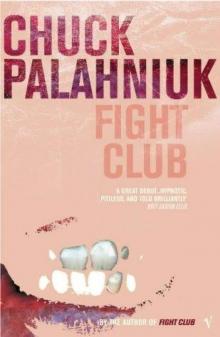 Fight Club
Fight Club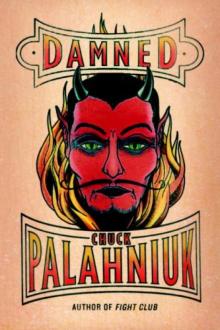 Damned
Damned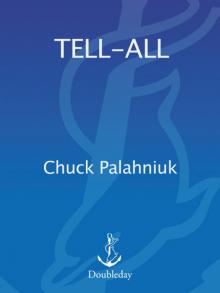 Tell-All
Tell-All Choke
Choke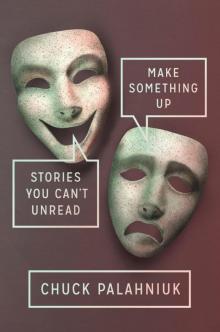 Make Something Up: Stories You Can't Unread
Make Something Up: Stories You Can't Unread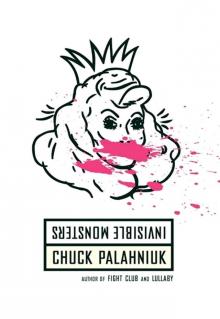 Invisible Monsters
Invisible Monsters Phoenix
Phoenix Beautiful You: A Novel
Beautiful You: A Novel Haunted
Haunted Survivor
Survivor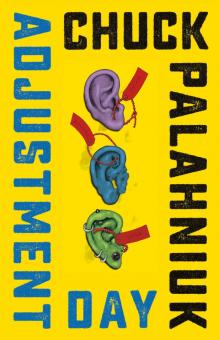 Adjustment Day
Adjustment Day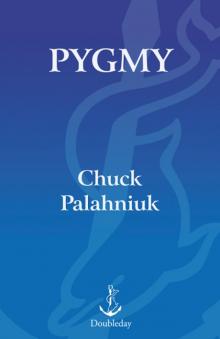 Pygmy
Pygmy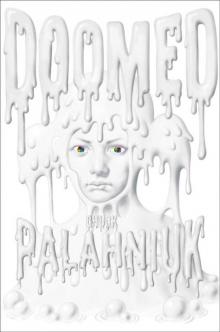 Doomed
Doomed Lullaby
Lullaby Snuff
Snuff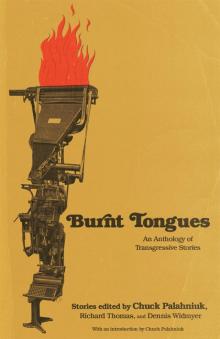 Burnt Tongues
Burnt Tongues The Invention of Sound
The Invention of Sound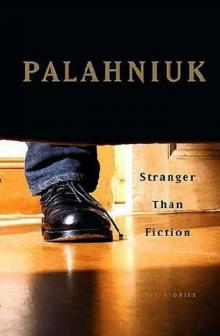 Stranger Than Fiction (True Stories)
Stranger Than Fiction (True Stories)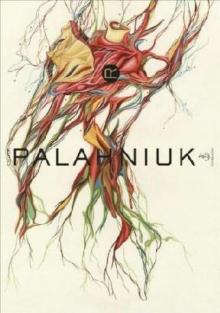 Rant: The Oral History of Buster Casey
Rant: The Oral History of Buster Casey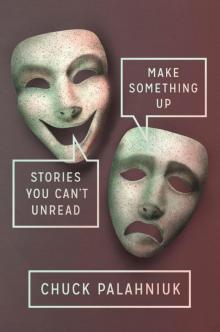 Make Something Up
Make Something Up Rant: An Oral Biography of Buster Casey
Rant: An Oral Biography of Buster Casey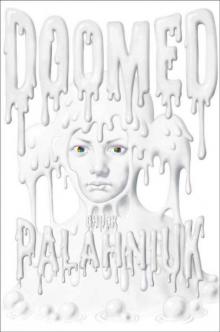 Doomed d-2
Doomed d-2 HOPE AND GORY
HOPE AND GORY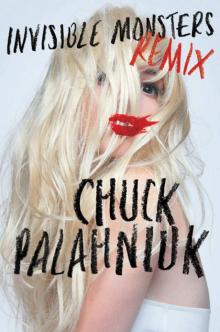 Invisible Monsters Remix
Invisible Monsters Remix Beautiful You
Beautiful You Fugatives & Refugees
Fugatives & Refugees